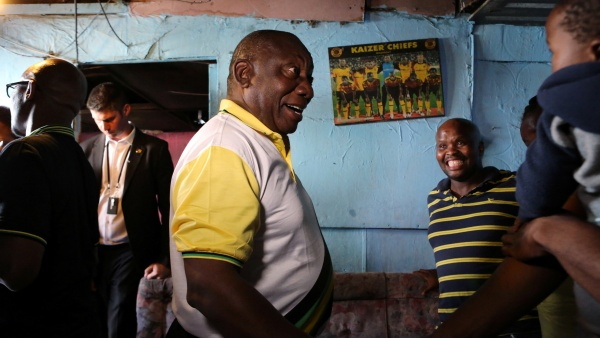South Africans will head to the polls on May 8 to cast their ballots in the country's general elections. It's the sixth national and provincial elections since the dawn of democracy in 1994. Almost 27 million registered voters will decide who will lead the country for the next five years.
What are national and provincial elections?
Voters will participate in two separate elections, to elect representatives to the National Assembly and the provincial legislatures.
On the national ballot paper, they will vote for the political party they want to represent them in the National Assembly, while on the provincial ballot paper, they will select a party to represent them in one of the country's nine provincial legislatures.

Musa Masina lines up election posters with the face of ANC president Cyril Ramaphosa, before hanging them on street poles in Soweto, South Africa, March 12, 2019. /Reuters Photo
Musa Masina lines up election posters with the face of ANC president Cyril Ramaphosa, before hanging them on street poles in Soweto, South Africa, March 12, 2019. /Reuters Photo
Voters do not choose their representatives directly. Each political party has already submitted a list of members to take up the seats in the national and provincial legislatures.
What are the national and provincial legislatures?
The South African Parliament is made up of two houses: the National Assembly and the National Council of Provinces. The National Assembly is directly elected by voters through proportional representation and is made up of 400 members (MPs).
The number of seats a party has is proportionate to the votes received in the national election. The National Council of Provinces is elected by the nine provinces and is the voice of provincial interests in the national government. The two houses are responsible for making and passing laws.
Each of the nine provinces has a provincial legislature, which varies in size depending on the province's population. They're responsible for passing provincial laws.
Who is contesting the election?
A record 48 parties will appear on the national ballot in the 2019 elections. Polls suggest the governing African National Congress (ANC) is expected to comfortably retain power, but fall short of the 62.2 percent share of the vote it won in the 2014 elections.
This means Cyril Ramaphosa, who replaced the ousted Jacob Zuma in February 2018, will remain president.

South Africa's President Cyril Ramaphosa (R) is sworn into office at the Parliament in Cape Town, February 15, 2018. /VCG Photo
South Africa's President Cyril Ramaphosa (R) is sworn into office at the Parliament in Cape Town, February 15, 2018. /VCG Photo
The ANC, Africa's oldest liberation movement, has been in power since Nelson Mandela was elected president after the country's first democratic elections in 1994. The main opposition, the Democratic Alliance (DA), led by Mmusi Maimane, is expected to come second, but polls suggest it will also lose support.
The Economic Freedom Fighters (EFF), led by former ANC youth wing leader and firebrand politician Julius Malema, is likely to finish third, with an increased share of the vote.
What electoral system is used?
For national and provincial elections, South Africa uses the system of proportional representation. Seats are awarded according to the percentage of votes parties win.
The seats are filled according to the list of candidates the parties have submitted to the electoral agency.
How is the president elected?
The president is not elected directly. Instead, the election determines the members of Parliament. Candidates for president will be nominated from among the MPs, who will vote for their preferred candidate.
Anyone can nominate a candidate, but the president is effectively the leader of the majority party.
What are the burning issues?
South Africa's sixth democratic administration will have to focus its efforts on growing the economy. Slow growth and massive unemployment are among the country's biggest challenges. In 2018, GDP grew less than one percent while the unemployment rate is at 27.1 percent.
According to the Economist's Pocket World in Figures, South Africa has the world's highest youth unemployment rate.
The government will also have to fix the country's ailing state-owned enterprises. Energy utility Eskom has been forced to implement rolling power cuts in recent weeks to avoid a total collapse of the grid, due to ongoing plant breakdowns.

President Cyril Ramaphosa greets supporters during an election campaign visit to Khayelitsha township near Cape Town, South Africa, February 27, 2019. /Reuters Photo
President Cyril Ramaphosa greets supporters during an election campaign visit to Khayelitsha township near Cape Town, South Africa, February 27, 2019. /Reuters Photo
Other state companies, like the national carrier, SAA, and Transnet, the state rail, port, and pipeline company, are drowning in debt.
Tackling corruption is a key campaign promise of all the parties. President Ramaphosa has said he is committed to rooting out graft. Before his removal as president, Jacob Zuma established a commission to probe the alleged capture of state institutions.
There is also a new chief prosecutor, untainted by political factions. But no one has yet been prosecuted for looting state coffers.
The current Ramaphosa government has also vowed to speed up land reform. An ANC resolution to support land expropriation without compensation has rattled some investors, but Ramaphosa has been quick to reassure them that there will be no land grabs, and foreign investments will be protected.
A constitutional amendment to allow for land expropriation without compensation will not occur before the elections, as MPs were unable to conclude their work before the end of the parliamentary term.
(Top image: An election campaign ads in Alexandra, South Africa, April 11, 2019. /AFP Photo)





